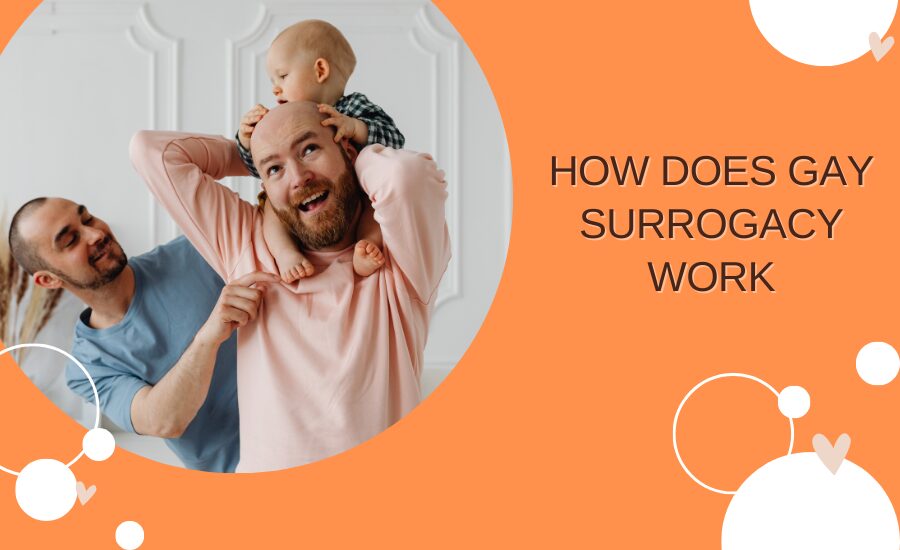LGBT Surrogacy: All You Need to Know to Grow Your Family

When it comes to expanding their family, same-sex couples have various options, including adoption, fostering, and surrogacy. But only surrogacy allows them a chance to have a genetic link with their children. LGBT surrogacy is an increasingly popular option for families in the LGBTQ+ community who want to grow their families.
Although LGBT people go through the same surrogacy process as any other intended parent, still, there are still certain differences you should be aware of before proceeding. In this article, we’ll explore how LGBT surrogacy works and some vital things you need to know when looking to have a baby via surrogacy.
Get in touch for FREE SURROGACY CONSULTING:
Mobile: +91-8800481100 ( WhatsApp, Line, Viber)
Email: neelam@ivfconceptions.com
For many LGBTQ+ individuals and couples, surrogacy offers a path to parenthood that was once out of reach. This comprehensive guide explores the world of LGBT surrogacy, addressing key considerations, legal aspects, and the emotional journey involved in this family-building option.
What is LGBT Surrogacy?
LGBT surrogacy refers to the process where a person or couple from the LGBTQ+ community works with a surrogate to have a child. This can involve various arrangements, including:
- Gay men using a surrogate and egg donor
- Lesbian couples where one partner’s egg is used and the other carries the pregnancy
- Transgender individuals using their own genetic material or donor gametes
Types of Surrogacy
There are two main types of surrogacy:
- Traditional Surrogacy: The surrogate uses her own egg and is artificially inseminated with sperm from one of the intended parents or a donor.
- Gestational Surrogacy: An embryo created through IVF using the intended parents’ or donors’ genetic material is transferred to the surrogate’s uterus.
For LGBT couples, gestational surrogacy is often preferred as it allows for a genetic connection to at least one partner.
The Surrogacy Process for LGBT Individuals and Couples
|
Step |
Description |
|
1. Consultation |
Meet with a fertility specialist to discuss options and create a treatment plan |
|
2. Choosing a Surrogate |
Work with an agency or independently to find a suitable surrogate |
|
3. Legal Agreements |
Draft and sign contracts outlining all parties’ rights and responsibilities |
|
4. Medical Screening |
Surrogate undergoes medical and psychological evaluations |
|
5. IVF and Embryo Transfer |
Create embryos and transfer to the surrogate’s uterus |
|
6. Pregnancy and Birth |
Support the surrogate throughout pregnancy and prepare for the child’s arrival |
|
7. Legal Parentage |
Establish legal parentage through court orders or adoption procedures |
Legal Considerations for LGBT Surrogacy
The legal landscape for LGBT surrogacy varies widely depending on location. Key considerations include:
- Surrogacy laws and regulations in your state or country
- Second-parent adoption procedures for non-biological parents
- Parental rights and responsibilities
- International surrogacy considerations for same-sex couples
It’s crucial to work with an experienced attorney specializing in reproductive law and LGBT family formation.
Emotional Aspects of LGBT Surrogacy
The surrogacy journey can be emotionally challenging for all involved. Some common experiences include:
- Excitement and anticipation
- Anxiety about the medical process
- Concerns about societal acceptance
- Building a relationship with the surrogate
- Preparing for parenthood in the face of potential discrimination
Support groups and counseling can be invaluable resources throughout this process.
Costs Associated with LGBT Surrogacy
Surrogacy can be expensive, with costs typically ranging from $100,000 to $200,000 or more. Expenses may include:
- Surrogate compensation
- IVF and medical procedures
- Legal fees
- Agency fees (if applicable)
- Insurance
- Travel and miscellaneous expenses
Some LGBT individuals and couples explore grants, loans, or crowdfunding to help finance their surrogacy journey.
Finding an LGBT-Friendly Surrogacy Agency
When choosing a surrogacy agency, look for:
- Experience working with LGBT clients
- Inclusive language and policies
- Connections with LGBT-friendly fertility clinics and attorneys
- Positive reviews from other LGBT parents

How does the LGBT surrogacy process work?
It goes without saying that surrogacy itself is a difficult process for intended parents who are considering this route for becoming parents. However, surrogacy is more challenging for same-sex partners and singles who wish to expand their families. This is due to the fact that there are fewer legal surrogacy options for them, as not all countries allow single or gay surrogacy.
Additionally, the cost of surrogacy for gays is higher as they need more medical and legal services, like an egg donor, and sometimes two-parent programs where each partner would like to have a genetic baby of their own and then legal adoption of the baby by the other.
It is crucial that LGBT surrogacy seekers choose countries where their rights are protected and they have a safe environment to pursue their parenthood dreams. They should feel supported and comfortable knowing that their rights are respected and that they will receive the same level of treatment as heterosexual couples.
Read more:
All you need to know about surrogacy cost
Legal countries for gay surrogacy

How much does LGBT surrogacy cost?
The LGBT surrogacy cost is a major challenge for many couples and individuals. Despite the cost, LGBT couples and individuals must remember that their decision to pursue parenthood is deeply personal, and they should never sacrifice their rights or compromise their safety for the sake of affordability.
All LGBT couples and individuals looking to become parents through surrogacy should ensure that they find a reputable and experienced professional, who will protect their legal rights and interests.
The surrogacy cost is much higher irrespective of the family type using this mode of becoming parents. So, a same-sex couple expects to pay at least $150,000 for their surrogacy program in the USA.
The actual cost may vary based on a variety of criteria, including the surrogate mother’s state, the number of IVF cycles required, the type of donated eggs utilized, and the surrogacy service you select. International surrogacy countries like Mexico and Colombia offer affordable yet legal surrogacy options.
The cheapest surrogacy countries for gay couples is Mexico and Colombia with secure or fixed-cost guaranteed baby plans for as low as $67,000.
It is true that the high cost of surrogacy makes it out of reach for many gay couples, and they need to find other options instead of giving up their dream of parenthood. Luckily, there are some ways in which they can still follow their surrogacy baby dream.
- Look out for financing options that offer loans and grants for such services. This type of grant is only possible in the US.
- Opting for altruistic surrogacy, where the surrogate mother can be a friend or relative who offers to help so you can reduce the cost of surrogate compensation.
- Look out for affordable yet legal international surrogacy countries where gay surrogacy is allowed like Mexico, Colombia, and some hybrid plans.
Why selecting an LGBT-friendly surrogacy agency/ professional is important?
If you are considering surrogacy as a way to start or grow your family, it is important to choose a surrogacy agency that is supportive and inclusive of LGBT individuals and families.
Here are a few things to consider when choosing an LGBT-friendly surrogacy agency:
- Services: Make sure the surrogacy agency/professionals offer services that meet your needs as an LGBT individual or couple. This may include egg or sperm donation, gestational surrogacy, or other fertility treatments.
- Inclusivity: Look for an agency that is explicitly welcoming and inclusive of LGBTQ+ individuals and families. This may be indicated on their website or through the language they use in their materials.
- Reputation: Research the agency’s reputation within the LGBT community. This may include reading reviews or testimonials from other LGBT individuals who have used their services.
- Legal support: It is important to choose an agency that is knowledgeable about the laws and regulations surrounding surrogacy and can provide legal support throughout the process.
- Counseling: Surrogacy can be a complex and emotionally challenging process. Look for an agency that offers counseling and support for both intended parents and surrogates.
By considering these factors, you can find an agency that is supportive and inclusive of your needs as an LGBTQ+ individual or couple.
Other Considerations for LGBT Parents
There are a number of considerations that LGBTQ+ parents may face, some of which may be unique to their situation. Some of these considerations include:
- Legal considerations: Depending on where you live, there may be different laws and regulations regarding LGBTQ+ parenting, including adoption, surrogacy, and fertility treatments. It is important to understand the legal landscape in your area and to seek the advice of a qualified attorney, if necessary.
- Social stigma: While attitudes towards LGBTQ+ families have improved in recent years, there may still be social stigma and discrimination that LGBTQ+ parents face. It is important to have support systems in place, such as a network of friends and family, to help you navigate any challenges you may face.
- Health care: LGBTQ+ parents may face challenges in finding healthcare providers who are knowledgeable about and sensitive to their needs. It is important to research healthcare providers who are LGBTQ+ inclusive and supportive.
- Schooling: LGBTQ+ parents may face challenges in finding schools that are inclusive and supportive of their children. It is important to research schools in your area and to advocate for the inclusion and acceptance of your children in the school community.
- Parenting: LGBTQ+ parents may face unique challenges in parenting and may have different concerns and needs than heterosexual parents. It is important to seek out resources and support specific to LGBTQ+ parenting, such as support groups and online communities.

LGBT surrogacy process: A step-by-step guide
The surrogacy process can vary depending on the specific arrangements and laws in your area. However, here is a general outline of the process:
- Research and education: The first step in the surrogacy process is to educate yourself about the different options and considerations involved. This may include researching surrogacy agencies, fertility clinics, and legal resources.
- Choose a surrogacy agency: Once you have a good understanding of the surrogacy process, you can begin looking for a surrogacy agency that meets your needs. This may involve researching different agencies, reading reviews and testimonials, and speaking with agency representatives.
- Match with a surrogate: After choosing an agency, you will work with them to find a surrogate who meets your specific needs and requirements. This may involve completing a profile, discussing your preferences with the agency, and reviewing potential surrogates.
- Legal agreements: Before the surrogacy process can begin, you will need to complete legal agreements with your surrogate. These agreements will outline the rights and responsibilities of both parties, as well as any financial arrangements.
- Fertility treatments: The next step in the process is to begin fertility treatments, which may involve egg or sperm donation, in vitro fertilization (IVF), or other assisted reproductive technologies.
- Pregnancy and childbirth: Once the surrogate becomes pregnant, you will work with her and the medical team to ensure a healthy pregnancy and delivery. After the baby is born, you will need to finalize the surrogacy arrangements and take any necessary legal steps to establish your parental rights.
It is important to note that the surrogacy process can be complex and may involve many different steps and considerations. It is recommended to work with a surrogacy agency and legal professionals to ensure a smooth and successful process.
Conclusion for LGBT surrogacy
Surrogacy can be a viable option for LGBT individuals and couples who wish to start or grow their families. While the process can be complex and may involve unique considerations, there are many resources and agencies available to support LGBT individuals and couples throughout the process.
It is important to thoroughly research and educate yourself about the different options and considerations involved, and to work with a surrogacy agency and legal professionals to ensure a smooth and successful process. It is good to consult with surrogacy professionals who have deep knowledge about the domain and help you with finding the best surrogacy agencies or clinics.
By taking the time to carefully plan and prepare, you can achieve your dream of becoming a parent and creating a loving and supportive family.
If you’d like to learn more about IVF, Egg Donation, or surrogacy services globally, check out the rest of our website at IVF Conceptions. We offer legally secure and affordable surrogacy consulting services for FREE.
Get in touch for FREE SURROGACY CONSULTING:
Mobile: +91-8800481100 ( WhatsApp, Line, Viber)
Email: neelam@ivfconceptions.com

